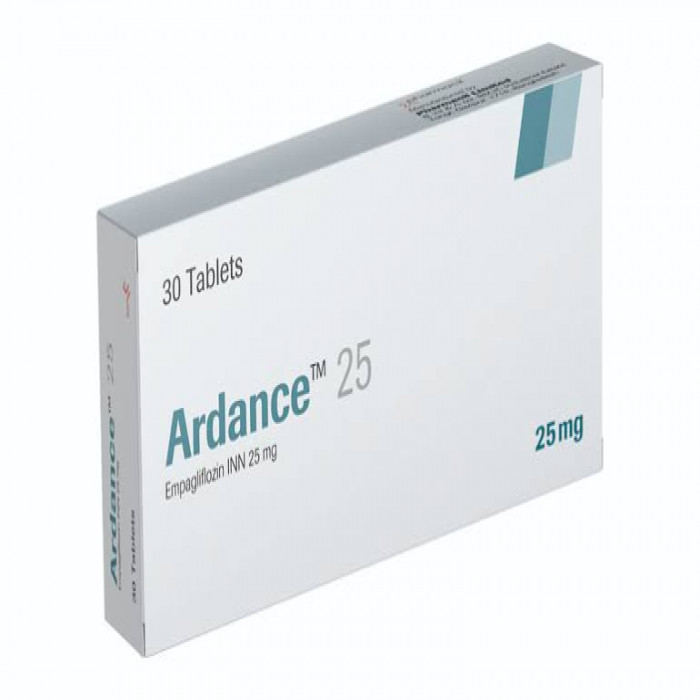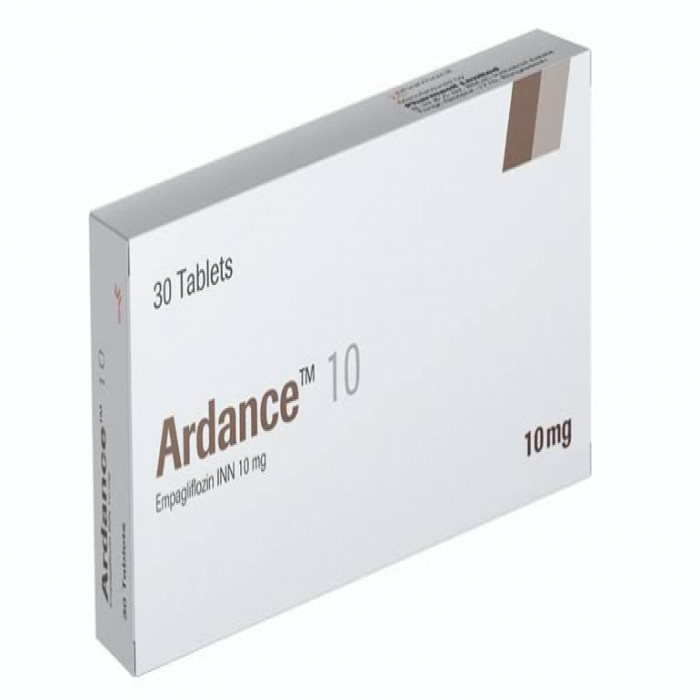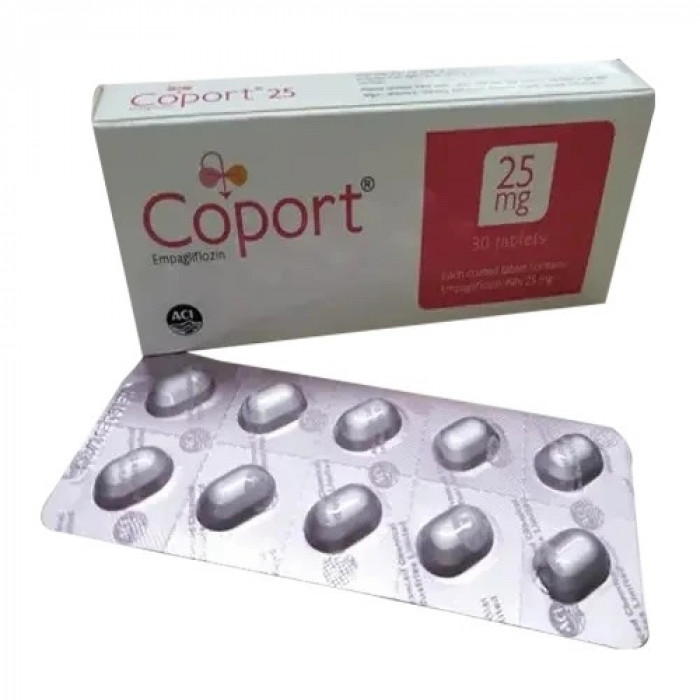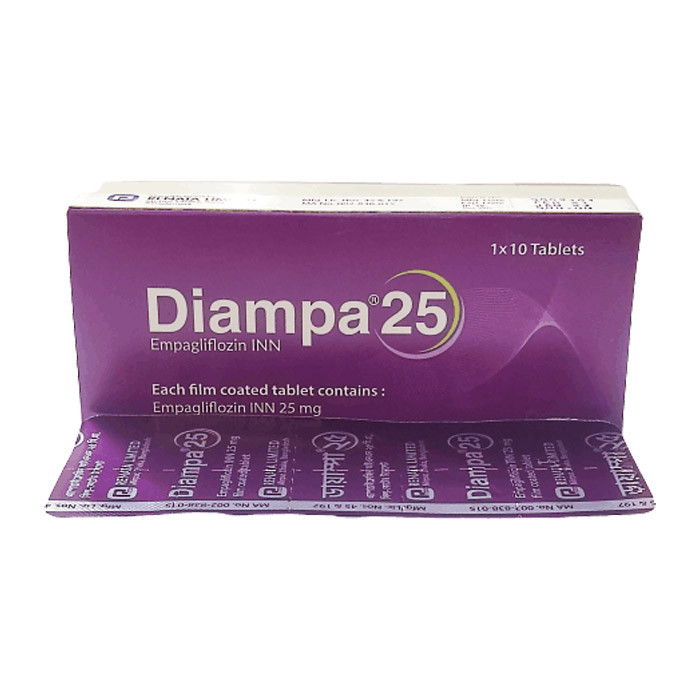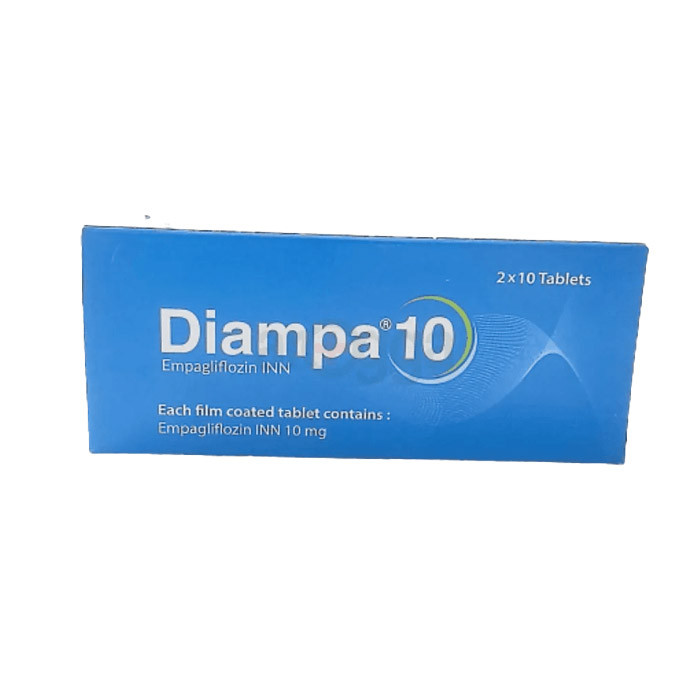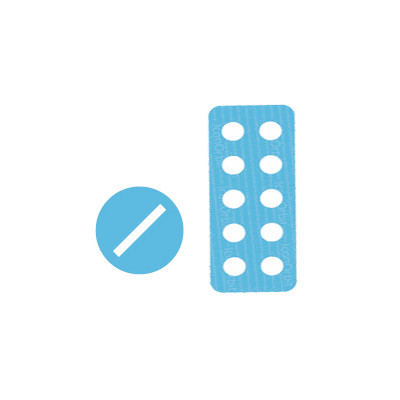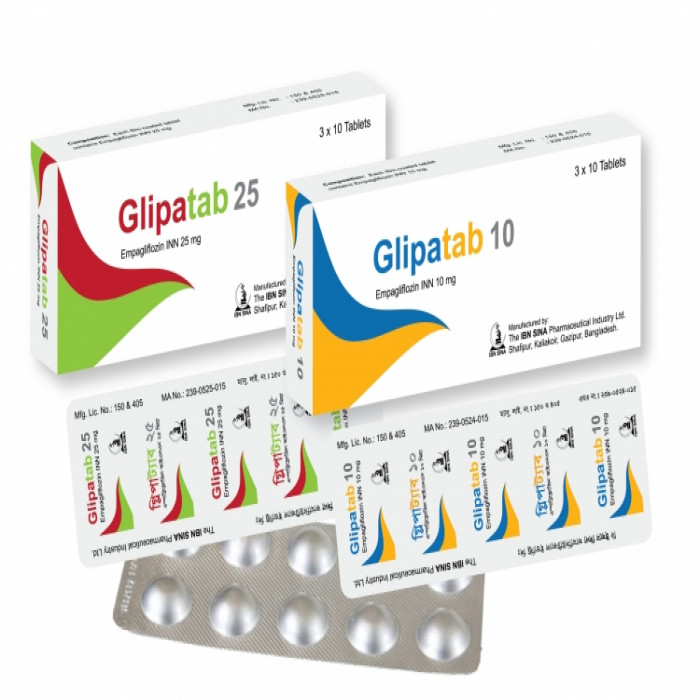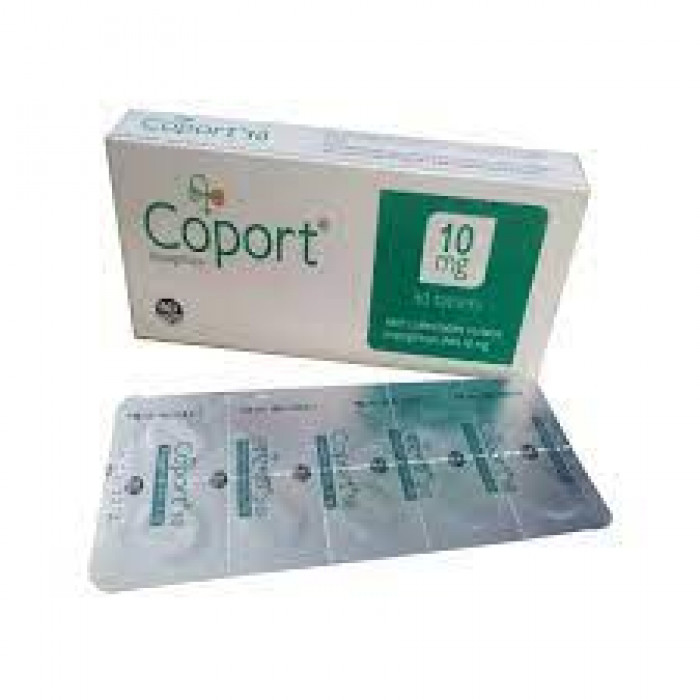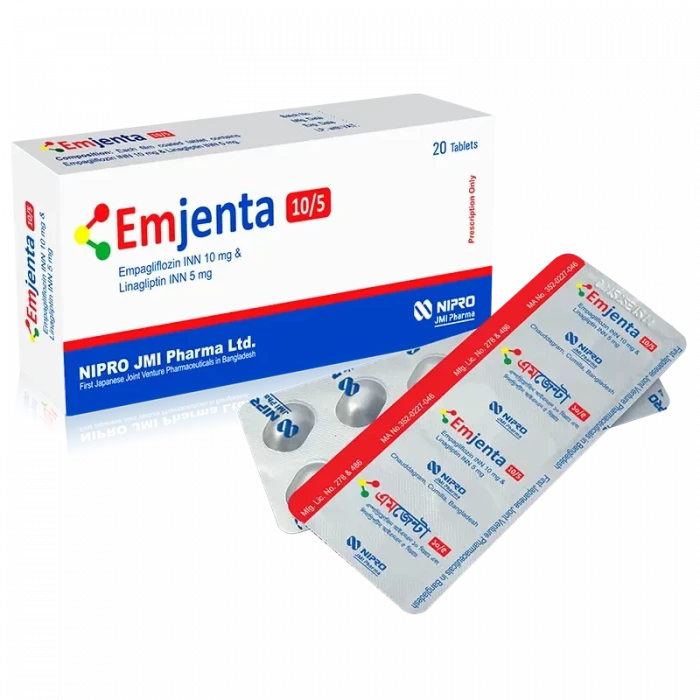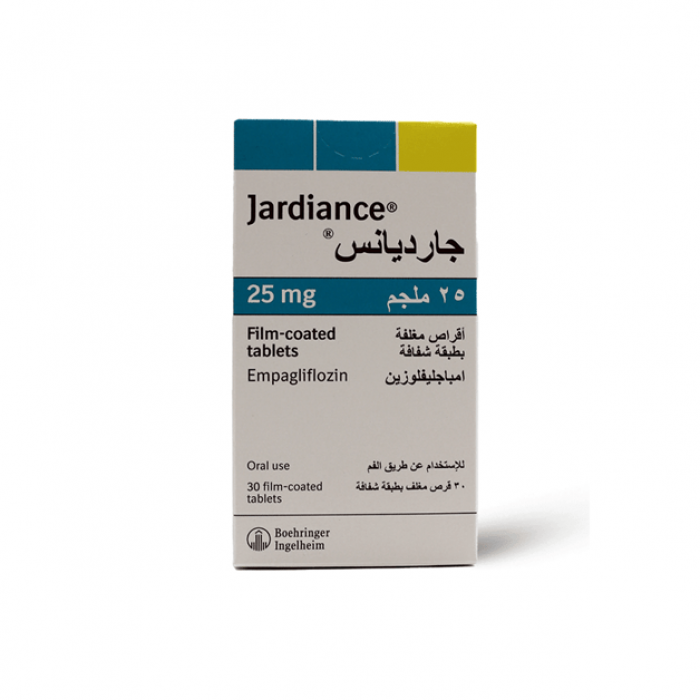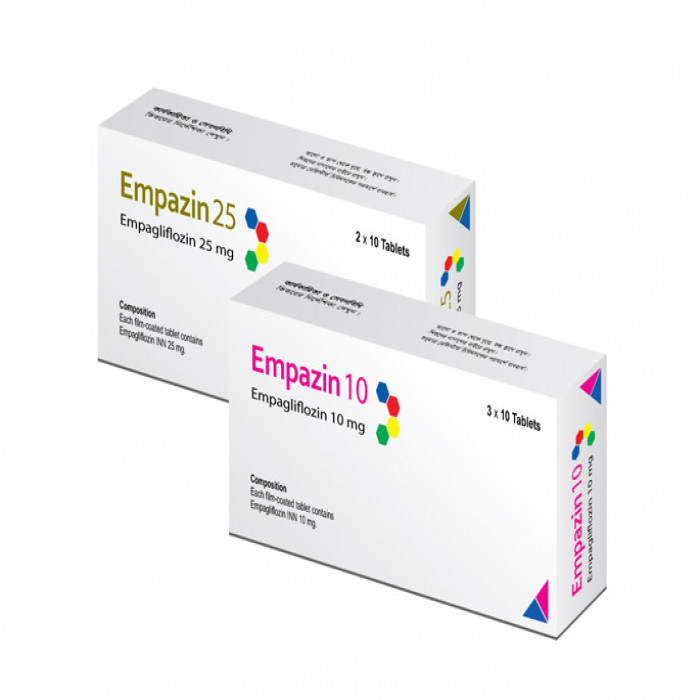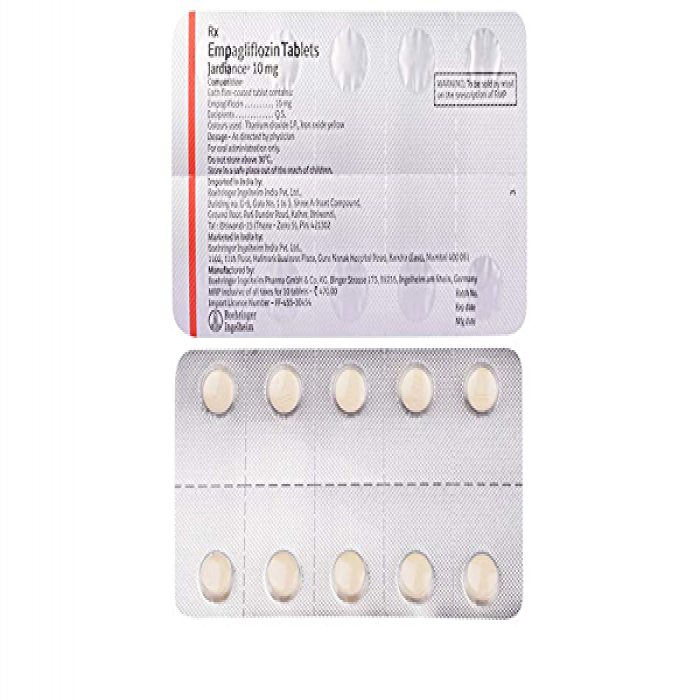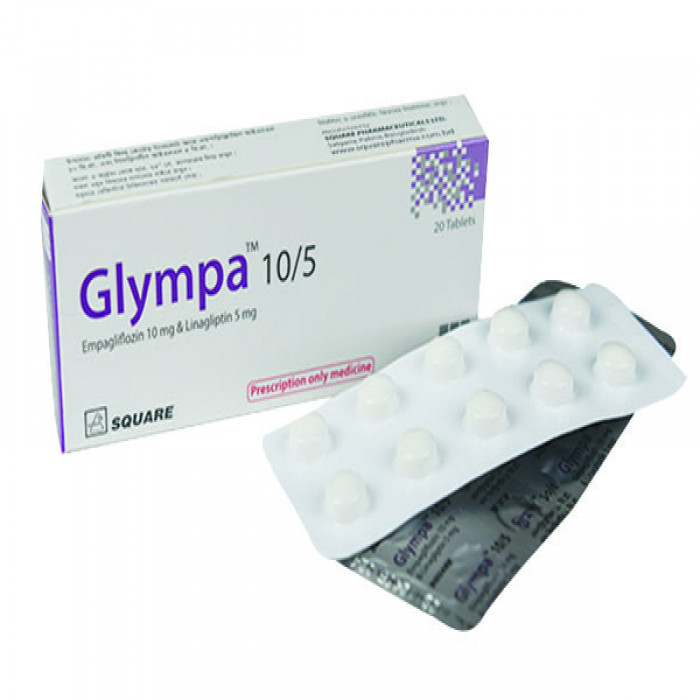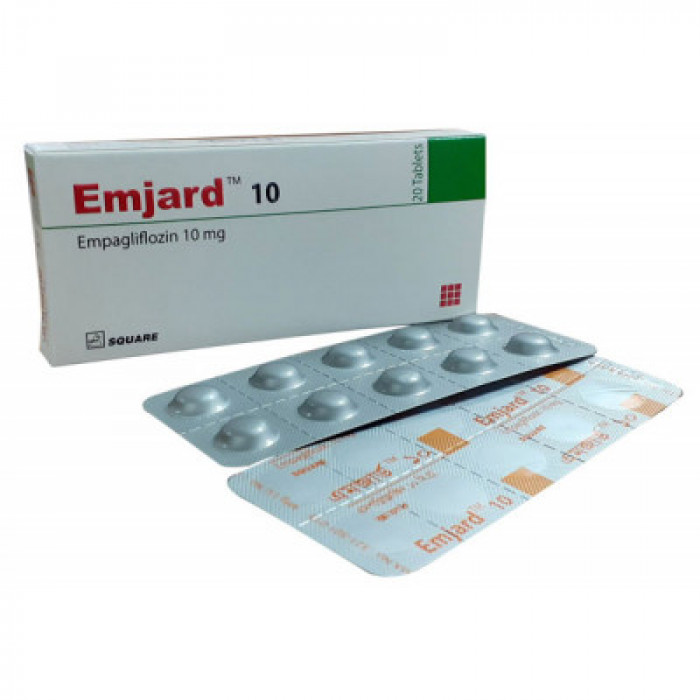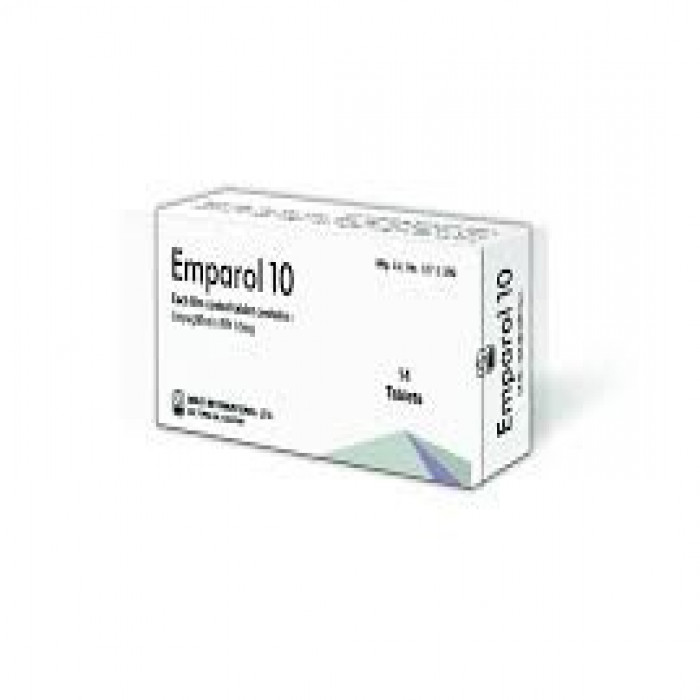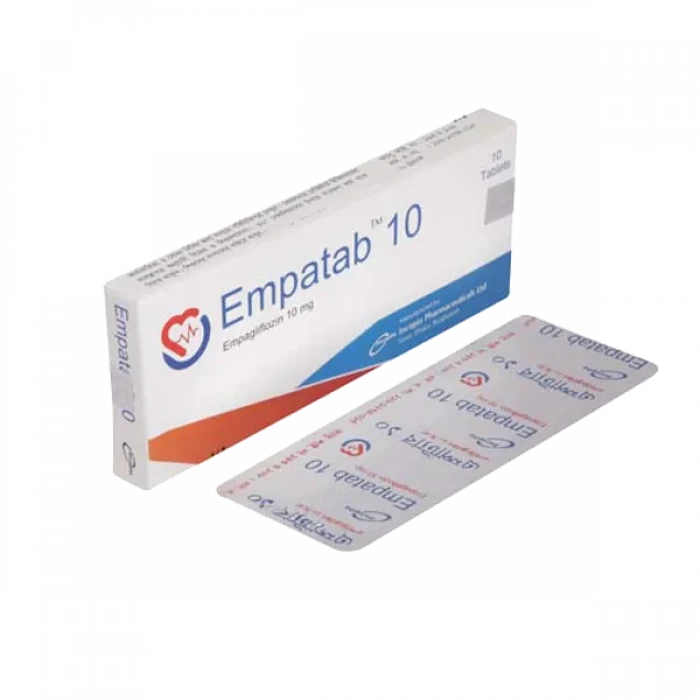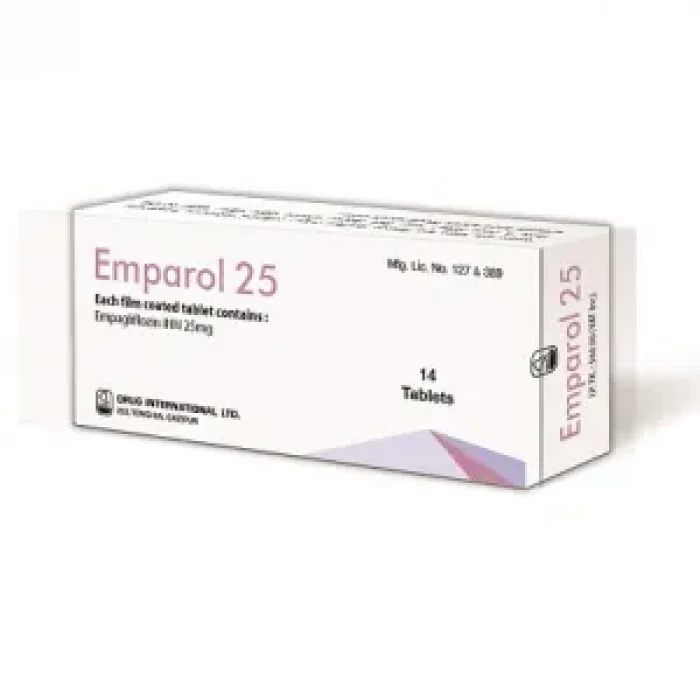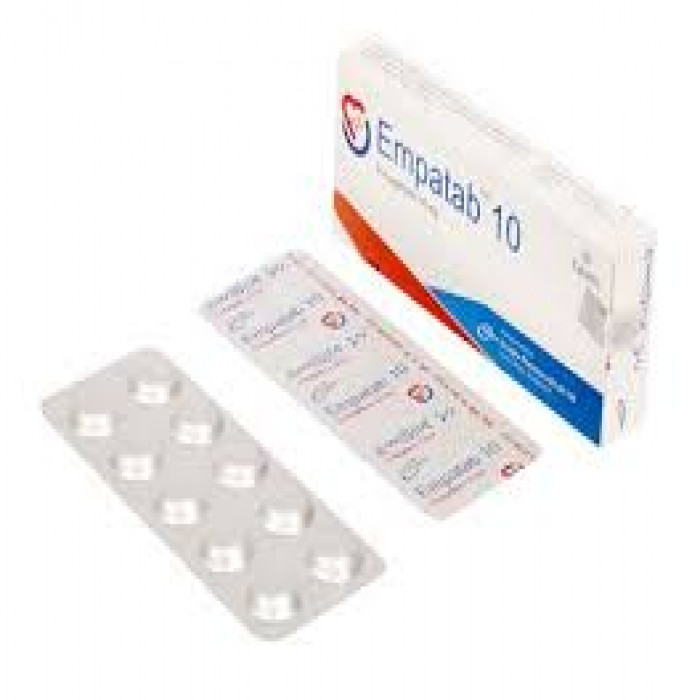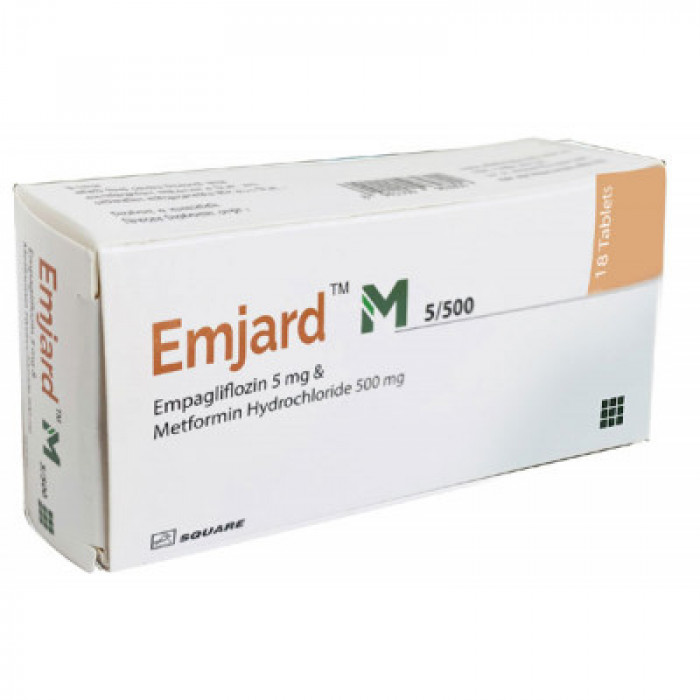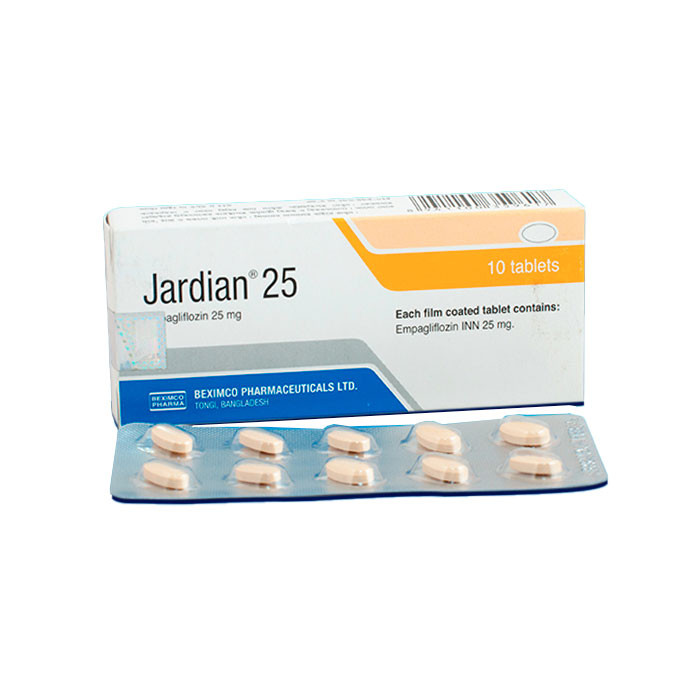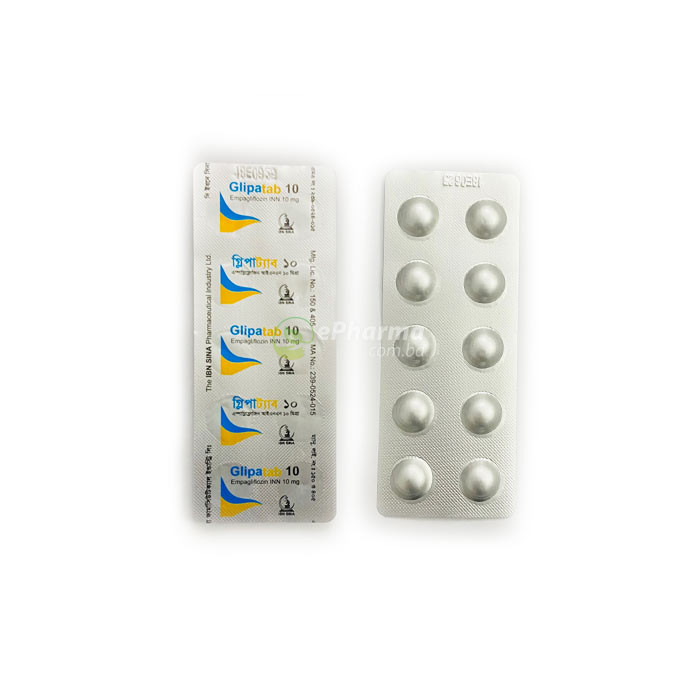
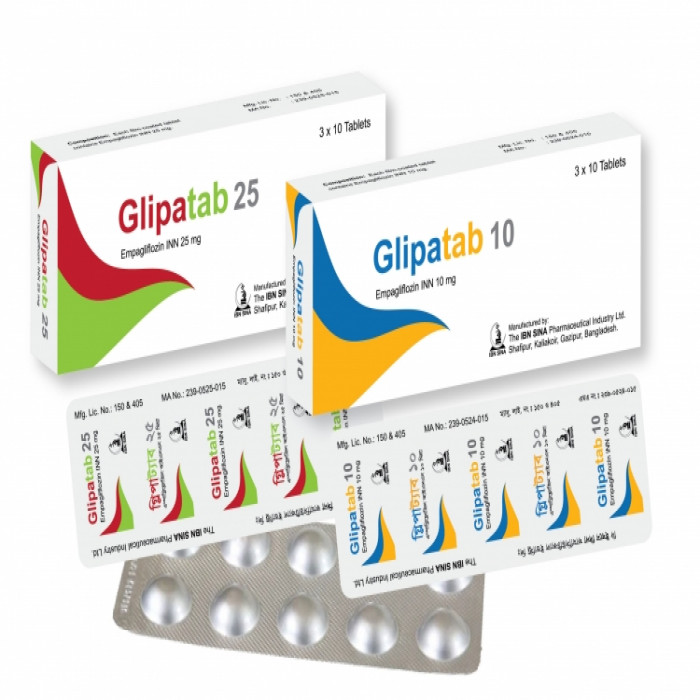
✔ 100% Authentic Product
👁️ Currently Viewing 5045
Glipatab 10mg Tablet
Glipatab 10mg Tablet is used to lower blood sugar levels in adults with type 2 diabetes who have failed to achieve control by diet and exercise alone.
Discount
Price: ৳ 150
MRP:
৳
160
6%
Off

100% Genuine Products, Guaranteed

Safe & Secure Payments, Always

Fast, Secure & Efficient Delivery

Proper Packaging
 Cash on Delivery - All over Bangladesh
Cash on Delivery - All over Bangladesh Regular Delivery - 12-24 Hours, Dhaka City* Charge Tk.39-59
Regular Delivery - 12-24 Hours, Dhaka City* Charge Tk.39-59 Regular Delivery - 24-48 Hours, Other Cities* Charge Tk.99-110
Regular Delivery - 24-48 Hours, Other Cities* Charge Tk.99-110
 ফ্রি ডেলিভারিঃ - ৯৯৯ টাকা+ অর্ডারে, ঢাকা
শহরে
ফ্রি ডেলিভারিঃ - ৯৯৯ টাকা+ অর্ডারে, ঢাকা
শহরে ফ্রি ডেলিভারিঃ - ২৯৯৯ টাকা+ অর্ডারে, ঢাকার
বাহিরে
ফ্রি ডেলিভারিঃ - ২৯৯৯ টাকা+ অর্ডারে, ঢাকার
বাহিরে
100% Genuine Products, Guaranteed
Safe & Secure Payments, Always
Fast, Secure & Efficient Delivery
Proper Packaging
 Cash on Delivery - All over Bangladesh
Cash on Delivery - All over Bangladesh Regular Delivery - 12-24 Hours, Dhaka City* Charge Tk.39-59
Regular Delivery - 12-24 Hours, Dhaka City* Charge Tk.39-59 Regular Delivery - 24-48 Hours, Other Cities* Charge Tk.99-110
Regular Delivery - 24-48 Hours, Other Cities* Charge Tk.99-110 ফ্রি ডেলিভারিঃ - ৯৯৯ টাকা+ অর্ডারে, ঢাকা
শহরে
ফ্রি ডেলিভারিঃ - ৯৯৯ টাকা+ অর্ডারে, ঢাকা
শহরে ফ্রি ডেলিভারিঃ - ২৯৯৯ টাকা+ অর্ডারে, ঢাকার
বাহিরে
ফ্রি ডেলিভারিঃ - ২৯৯৯ টাকা+ অর্ডারে, ঢাকার
বাহিরে
✅ Description:
EMPAGLIFLOZIN is classified as an antidiabetic medication belonging to the group of sodium-glucose co-transporter-2 (SGLT2) inhibitors. It is prescribed for individuals with type 2 diabetes whose blood sugar levels cannot be adequately controlled through diet and exercise alone. Type 2 diabetes arises when the body either doesn't produce enough insulin or the insulin it produces doesn't function effectively.
The core component of Glipatab 10mg Tablet is empagliflozin. This active ingredient operates by inhibiting the sodium-glucose co-transporter-2 (SGLT-2) enzyme found in the kidney's proximal tubules. This action curtails glucose reabsorption in the kidneys and enhances glucose excretion in urine by obstructing SGLT2. As a result, blood sugar levels are lowered in diabetic individuals.
Adhere to your prescribed regimen when taking Empagliflozin. Follow your doctor's instructions and continue using the medication according to your medical needs. Potential side effects could include thrush, discomfort or burning sensation during urination, increased urination frequency, and mild skin rash or itching. Most of these side effects typically resolve on their own over time and do not demand immediate medical intervention. However, if these effects persist, consulting your doctor is recommended.
If you have allergies to any components of Empagliflozin, avoid its consumption. For pregnant or breastfeeding individuals, consulting a doctor before taking Empagliflozin is advised. It's advisable to refrain from alcohol consumption while on Empagliflozin to prevent potential adverse reactions. Usage of Empagliflozin in children is limited and not recommended. Inform your doctor about your medication history and medical conditions to mitigate any potential undesirable interactions or side effects.
Safety Advices

Alcohol
UNSAFE
Consumption of alcohol is not recommended during treatment with Glipatab 10mg Tablet due to the increased risk of alteration in blood sugar levels.

Pregnancy
CONSULT YOUR DOCTOR
There is limited information about the safety of Glipatab 10mg Tablet so always take a doctor's advice before using this medicine if you are pregnant or planning to have a baby.

Breastfeeding
CONSULT YOUR DOCTOR
There is limited information about the safety of Glipatab 10mg Tablet in lactating mothers. Thus, it is recommended to avoid this medicine while breastfeeding. Consult a doctor before using, if you are breastfeeding your baby.

Driving
CAUTION
There is no interaction between driving and consuming this drug. So dose alteration is not needed.

Kidney
CONSULT YOUR DOCTOR
Glipatab 10mg Tablet should be taken with caution in patients with severe kidney disease and serious infection of the kidney. Consult your doctor before taking it.

Liver
CONSULT YOUR DOCTOR
Glipatab 10mg Tablet should be used with caution in patients with severe liver disease. Consult your doctor before taking it.
✔️ Uses of Glipatab 10mg Tablet
- Type 2 Diabetes
✔️ How does Glipatab 10mg Tablet work?
Glipatab 10mg Tablet works by removing excess sugar from the blood through the urine.
✔️ Side Effects of Glipatab 10mg Tablet
- Bladder pain
- Bloody or cloudy urine
- Difficult or painful urination
- Lower back pain
- Blurred vision
- Increased urination
- Fast heartbeat
- Sweating
- Vaginal infection
- Low blood sugar levels
- Urinary tract infection
✔️ Quick Suggestions:
- Empagliflozin is used to help control blood sugar levels in individuals with type 2 diabetes, either on its own or in combination with other diabetes medications.
- One potential side effect of empagliflozin is increased urination, which can lead to dehydration. It's recommended to drink plenty of water and stay hydrated while taking this medication.
- Empagliflozin can cause low blood sugar levels (hypoglycemia) when used with other antidiabetic medications, alcohol, or if meals are delayed or missed. Carrying a source of fast-acting sugar, like sugary food or fruit juice, can help counteract hypoglycemia symptoms.
- This medication has been associated with an increased risk of genital fungal and urinary tract infections in both males and females. Practicing good hygiene can help minimize the risk.
- Regular monitoring of blood sugar levels is important while taking empagliflozin to ensure that your diabetes is well-managed.
- Inform your doctor if you experience specific symptoms such as constant dizziness, joint pain, cold-like symptoms, or unexplained nausea/vomiting. These could be potential side effects that need medical attention.
✔️ Indication
Glipatab 10mg Tablet is used to treat type 2 diabetes when blood sugar level cannot be controlled with diet and exercise alone.
✔️ Pharmacology
Empagliflozin is indeed an inhibitor of the sodium-glucose co-transporter 2 (SGLT2) located in the kidneys. This class of medications is commonly referred to as SGLT2 inhibitors.
SGLT2 co-transporters are responsible for reabsorbing glucose from the glomerular filtrate back into the bloodstream. By inhibiting these transporters, empagliflozin reduces the reabsorption of glucose, allowing more glucose to be excreted in the urine. This action is termed "glucuretic," as it results in increased glucose excretion in the urine.
As a result of its mechanism of action, empagliflozin provides several beneficial effects for individuals with type 2 diabetes:
Lowering Blood Glucose: By inhibiting glucose reabsorption in the kidneys, empagliflozin helps to lower blood glucose levels. This is achieved by reducing the renal glucose threshold, which means that the kidneys start excreting glucose at lower blood glucose levels than usual.
Glucuretic Effect: The increased excretion of glucose in the urine contributes to the overall reduction of blood glucose levels.
Weight Loss: The glucuretic effect of empagliflozin, along with the associated loss of calories through the excretion of glucose in the urine, can lead to weight loss.
Blood Pressure Reduction: SGLT2 inhibitors like empagliflozin have been shown to have a positive impact on blood pressure. This effect is believed to be related to the diuretic action of increased glucose excretion.
Cardiovascular Benefits: In addition to its glucose-lowering effects, empagliflozin has demonstrated cardiovascular benefits in certain patient populations, including reduced risk of cardiovascular events.
✔️ Dosage & Administration of
Adult Dose for Type 2 Diabetes Mellitus:
- Initially, take 10 mg of Glipatab 10mg Tablet orally once daily in the morning.
- If additional glycemic control is necessary, the dose can be increased to 25 mg once daily.
Renal Dose Adjustments:
- For individuals with a creatinine clearance (CrCl) less than 60 mL/min but greater than or equal to 45 mL/min, the maximum recommended dose is 10 mg daily.
- However, for those with a CrCl less than 45 mL/min, Glipatab 10mg Tablet is contraindicated (not recommended) due to potential safety concerns.
Administration Instructions:
- Swallow the Glipatab 10mg Tablet with a glass of water.
- Do not crush or chew the tablet.
- Your doctor will determine the appropriate dose and duration based on factors like age, body weight, and disease condition.
- It's important not to stop taking Glipatab 10mg Tablet unless specifically advised to do so by your doctor.
✔️ Interaction
Interaction with Alcohol:
- Alcohol consumption is not recommended during treatment with Glipatab 10mg Tablet due to the potential for alterations in blood sugar levels.
Interaction with Other Medications:
- Glipatab 10mg Tablet interactions may occur with medications like acetazolamide, amlodipine, chlorthalidone, and gatifloxacin. These interactions could impact the effectiveness or safety of either medication.
Disease Interactions:
Glipatab 10mg Tablet should be used with caution in individuals with a history of hypotension (low blood pressure), impaired kidney function, or those using diuretics (water pills), as it may cause hypotension.
- There's an increased risk of genital mycotic infections (fungal infections in the genital area) associated with Glipatab 10mg Tablet. Caution is advised if you have a history of such infections.
✔️ Contraindications
If you are allergic to empagliflozin or any other ingredient of Glipatab 10mg Tablet.
✔️ Pregnancy & Lactation
There are no adequate and well-controlled studies of Empagliflozin in pregnant women. Empagliflozin should be used during pregnancy only if the potential benefit justifies the potential risk to the fetus. It is not known if Empagliflozin is excreted in human milk. It is not recommended when breastfeeding.
✔️ Precautions & Warnings
- If you have heart abnormalities, diabetic ketoacidosis, skin problems, acute pancreatitis, low blood sugar levels, or kidney or liver problems, it's essential to inform your doctor before taking empagliflozin. They can determine if the medication is appropriate for you and if any additional precautions are needed.
- If you are pregnant or breastfeeding, it's important to consult your doctor before taking empagliflozin. They can assess the potential risks and benefits and provide guidance on whether the medication is suitable for your situation.
- It's advised to avoid drinking alcohol while taking empagliflozin to prevent potential unpleasant side effects.
- Inform your doctor about all the medications you are currently taking, including over-the-counter drugs and supplements. Also, provide your complete medical history. This information helps your doctor evaluate potential interactions or risks associated with empagliflozin.
- Ketoacidosis is a serious complication of diabetes characterized by elevated levels of ketones in the blood. Glipatab 10mg Tablet should be used with extreme caution in individuals at risk of ketoacidosis, as it may increase the risk of this condition. It's important to follow all instructions given by your doctor to manage your diabetes effectively.
- Urosepsis is a severe condition in which a urinary tract infection spreads to the kidneys. Glipatab 10mg Tablet should be used cautiously in individuals with urosepsis or a history of urinary tract infections, as it might increase the risk of urinary tract infections and potentially worsen the condition. Following your doctor's instructions is crucial in such cases.
- If you have a history of hypoglycemia (low blood sugar), Glipatab 10mg Tablet should be used with caution, as it could potentially worsen the condition. Strictly adhering to your doctor's guidance is important in managing your blood sugar levels effectively.
- Glipatab 10mg Tablet should be used cautiously in individuals who are 65 years of age or older due to an increased risk of undesired effects. Your doctor will assess the risks and benefits to determine if Glipatab 10mg Tablet is appropriate for you.
- Glipatab 10mg Tablet is not recommended for use in children below 18 years of age due to a lack of safety and efficacy data in this age group.
✔️ Storage Conditions
Keep in a cool & dry place (below 30° C), protected from light & moisture. Keep out of the reach of children.
⚠️Disclaimer:
At ePharma, we’re committed to providing accurate and accessible health information. However, all content is intended for informational purposes only and should not replace medical advice from a qualified physician. Please consult your healthcare provider for personalized guidance. We aim to support, not substitute, the doctor-patient relationship.




